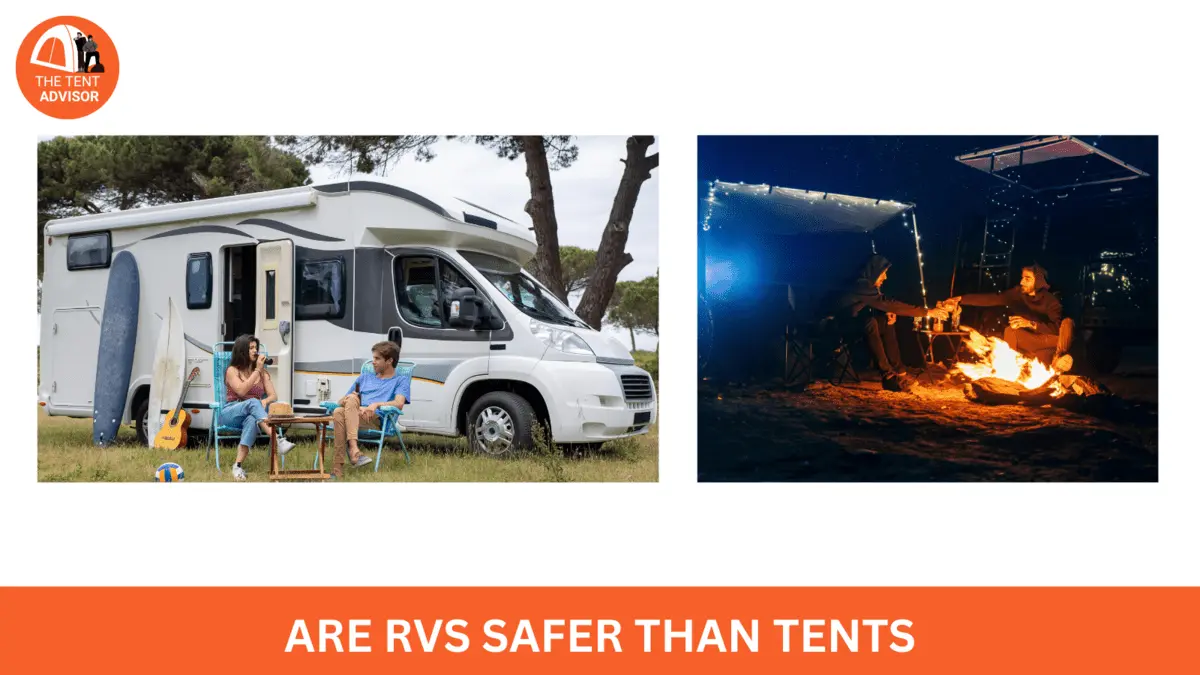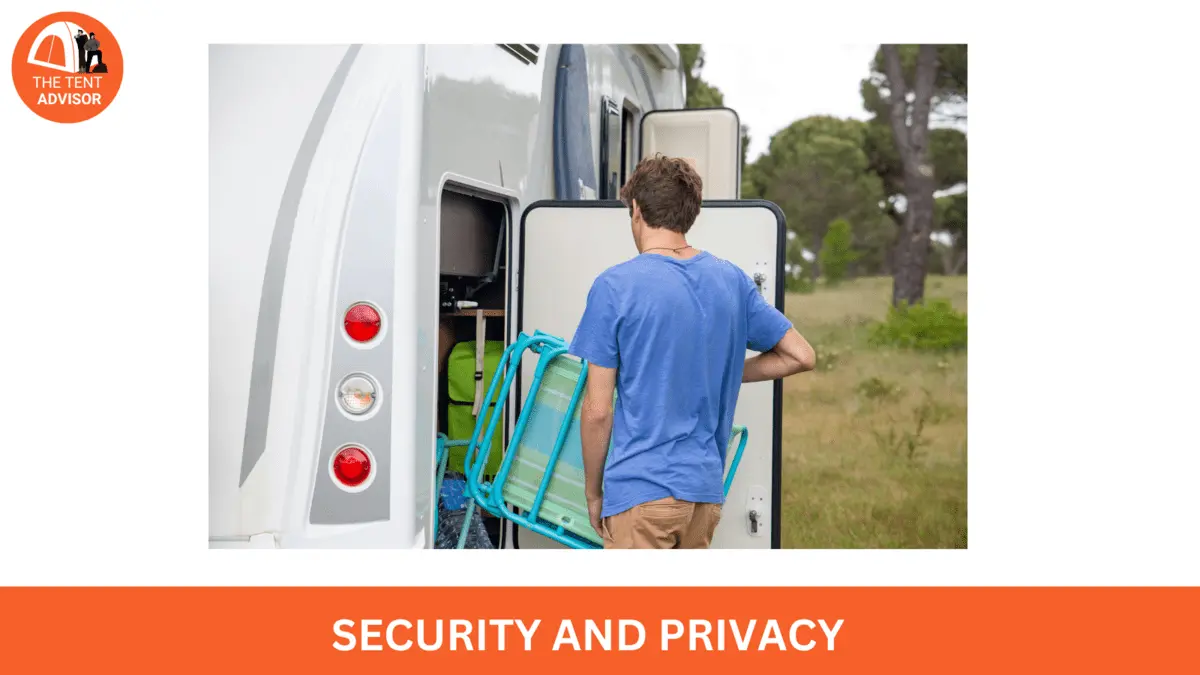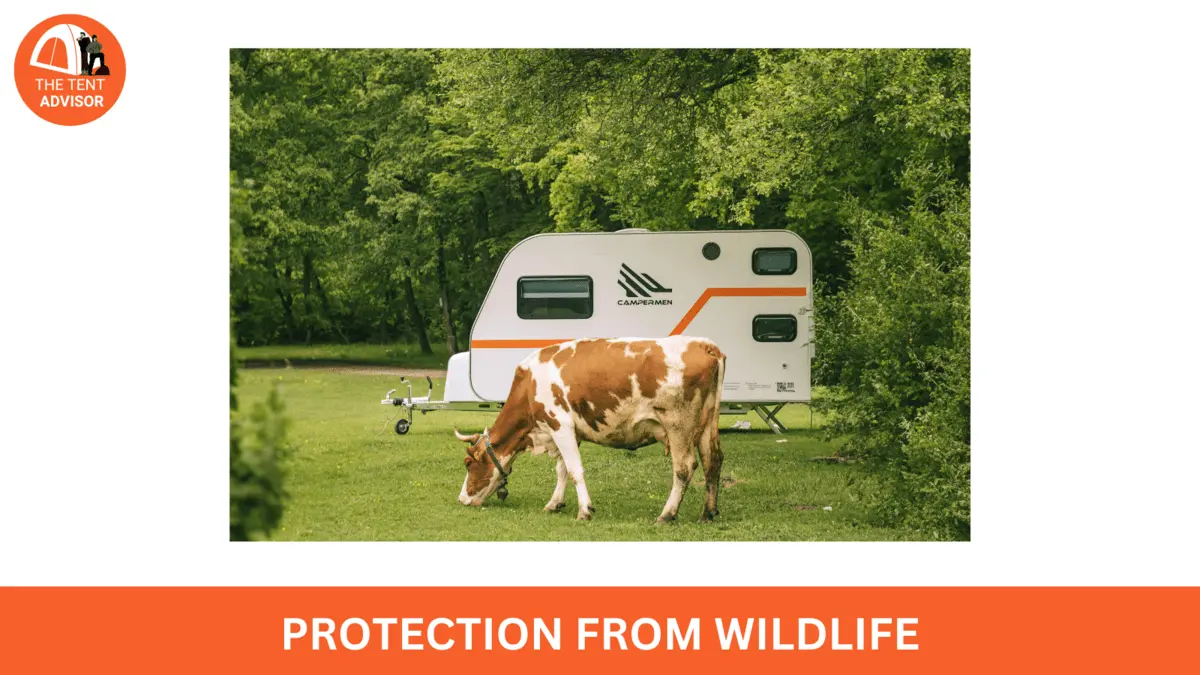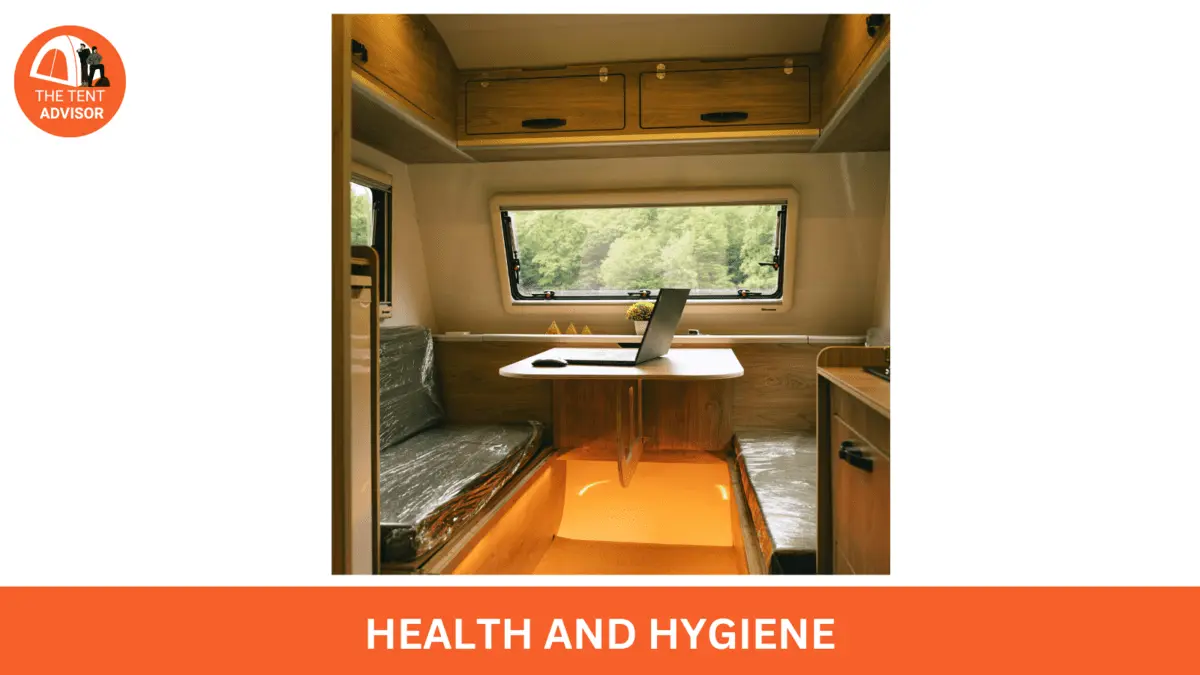Safety measures should be your top priority whenever you decide to go camping.
The question is whether RVs are safer than tents. Such questions, including the one above, help to understand the concerns of a camper who has safety insecurities. Below is a comparison of RVs and Tents regarding safety against weather, wild animals, and individual safety.
Are RVs safer than tents? A Comprehensive Comparison

Let’s find out the answer: Are RVs Safer Compared to Tents? Through our detailed guide.
Protection from Weather
Depending on the season, Heavy Snow, gusty winds, and heavy rains can occur. These elements may make camping quite uncomfortable, especially in a tent where one is exposed to more of them.
One of the most significant advantages that RVs have over native-tented tents is that they can withstand extreme conditions. A tent in extreme weather, such as heavy rainfall and extreme cold, may not perform its primary functions effectively.
Awful weather may result in water logging, which may promote the flimsiness of some of the tent pegs.
Also, even the most reliable tents come with leaks when it rains heavily, and the occupants inside the tent end up wet and miserable.
When it starts raining or snowing outside, you will want to be in an RV since it provides good shelter. Due to their materials these vehicles use, the wind and rain are kept outside, letting you remain warm and dry. RVs are also fitted with some forms of insulation, which helps maintain the RV’s temperature.
You can use heating and air conditioning systems within an RV, but it is impossible to do that inside a tent. Due to RVs’ sturdiness, once the weather turns rough, they aid one’s Security and peace of mind. Therefore, RVs are preferred over camping tents during the rainy season or heat fluctuations.
Security and Privacy

Personal Security is another aspect that RVs have an advantage over tents. In most cases, lots of people use Tents for camping. In some foresight, they do not have walls and are made of thin materials. It is common for the tent campers to feel such discomfort because they are virtually exposed to the environment as much as relatives within the camp, including wee as exterminators, for some privacy.
RVs have more rigid walls and doors which may be locked, and are less prone to security threats than tents.
In fact, you can lock yourself in a recreational vehicle or motorhome, a factor that is very reassuring, especially when spending time in an area that is not well-explored or well-known.
An RV protects you from unwanted human interference and wild, dangerous animals. This is one main reason families and people who camp with kids find RVs convenient: it offers a safer environment.
Read Also How-to-choose-a-car-tent
Protection from Wildlife

Animals can pose a threat or a danger to campers in wild forested regions, especially in bears, wolves and other animal-infested areas. In this case, tents made from cloth do not offer any form of shelter. Food smells are also one factor that attracts animals to the camping sites.
On the other hand, motor homes separate dwelling cabins from plants and animals.
Food remains that come from RVs cannot escape out as much as they can, and food remains are for animals to be able to get inside. If there is a bear in a skirt tent, for instance, it is highly possible that one would be severely injured without having a place to secure, but an RV instead offers a protective barrier that allows time to move from danger or will enable the area until it is safe to move.
Fire Safety
Once again, tents are at a disadvantage when it comes to fire safety. A campfire outside the tent or even a heater inside the tent is likely to cause a fire hazard. As we know, if a tent catches fire, it can spread quickly due to the inflammable materials used in its construction. For this reason, many campsites also do not allow open flames and gas-powered heaters inside tents.
On the other hand, RVs are designed with fire safety as a priority. Most RVs are fitted with smoke detectors and fire extinguishers. Many RVs also come with built-in kitchens with cooking ventilators, making cooking around an open fire in a tent safer. Looking into RVs doesn’t mean there are no fire hazards, but these hazards have become more accessible due to these safety features.
Health and Hygiene

Now, coming to the health concerns, tents offer scant physical protection from bugs, dirt, and other allergens from the outside, which could be a threat to you. Mainly, when sleeping in a tent, where one must sleep on the ground level, there is a greater risk of being around insects, mosquitos, or harmful creatures such as snakes. Even with the right clothes on, you are exposed to dirt from outside more than you would want.
RVs also add an extra layer of protection as they are enclosed structures that protect the occupants against outdoor exposure. They mostly feature toilets, washrooms, and appropriate facilities for storing food and water, making them more hygienic.
Read Also what-tent-brands-are-made-in-the-usa
Crime Prevention and Social Safety
For instance, in a place that has suffered theft, among other crimes, it may not be wise to sleep in a tent all the time. Compared to RVs, tents have no means of Security apart from a zipper, which is a significant drawback in case of theft.
On the other hand, RVs are especially hard to break into and are equipped with latches, old saddle locks, and sometimes alarm systems. In addition, several individuals living in RVs as vehicular homeless have indicated Security as the main reason for residing in a vehicle rather than on the streets as most people do. This points to the fact that RVs ensure safety to their users as they are like living in movable houses, unlike tents, which do not offer concentration to the occupant’s safety.
Are RVs Safer than Tents? Final Verdict
In terms of safety, RVs offer more Security than tents. Protection from the elements and wild animals, passenger safety, fire risks, and general sanitation are just a few of the qualities RVs were constructed with to provide protection and comfort. While tent camping is the most close and personal way of camping, those who prioritize safety when going on camping trips would prefer RVs over tents.
Read Also: what-is-a-truck-tent-and-when-should-you-use-one/
FAQs :Are RVs Safer than Tents?
1. Are RVs safe to sleep in?
Yes, sleeping within the confines of an RV is usually safe, but if the RV is moving, it is necessary to be buckled when occupying a passenger seat. Even if the vehicle has beds, passengers cannot sleep when the car is being driven; that is not allowed. The passengers are expected to buckle up during the travelling period to obtain protection.
2. Can I sleep in the RV while someone else is driving?
No, this is illegal and dangerous – one should not be in a bed in an RV while the RV is in motion. As a rule, the passengers should be seated and secured using the available seatbelts when the RV is in motion.
3. Are RVs safe for passengers?
RVs have not been manufactured with general crash safety in mind, and as such, they typically perform poorly in a crash. Most RVs do not utilize ordinary lap or shoulder belts in seats, and unsecured items are likely to become dangerous missiles. It would be wise to ensure that all the people are correctly seated with their seatbelts fastened in case of movement.
4. Are RVs safe for children?
As the Manufacturers Alliance for Child Passenger Safety (MACPS) states, every person’s dream is to travel on recreational vehicles. It is however not ideal, especially for kids since there are no proper child seat installations or safety features incorporated in the building. A standard car with the correct child seats is a lesser risk.
5. Is it safe to live in an RV full-time?
There are risks that one can appreciate living in an RV full-time, but they can be safe and risk-free, such as the following: Fire hazards: Gas lines and electrical systems require regular servicing while smoke detectors need to be in place. Air quality: Carbon monoxide detectors and ventilation are essential. Theft: Ensure the RV is insulated once you leave it, and add more security deterrents like alarms.
6. Why do people choose to camp in RVs?
Some campers prefer camping in an RV because it offers more safety and comfort. As the name suggests, an RV (rented vehicle) is a type of vehicle that is referred to as a moving tent since campers can lock the doors with all things inside. Compared to the usual tents, RVs also provide insulation against the weather, animals, or unwanted guests.
7. What safety precautions should I take while camping in an RV?
Remember to make sure your RV is well equipped with smoke detectors, carbon monoxide detectors, and fire extinguishers.
Take all loose items inside the RV and securely stow them away before driving to prevent them from turning into missiles.
Observe the safety rules in the RV park/campground to prevent accidents.
8. Are RVs safe in severe weather?
Yes, RVs protect against the weather elements better than tents. They provide greater protection from rain, wind, and heat extremes. But in case of a hurricane, storm, or tornado, it would be better to stay in a building than in an RV since they are not constructed to withstand highly destructive weather.
Can RVs be a fire hazard?
Yes, RVs have a fire risk, which is caused by electrical devices and gas-powered equipment confined in small spaces. To alleviate such threats, it is advisable to service the RV’s gas and electric systems regularly and have a fire extinguisher available at all times.
How can I make my RV safer for travel?
All passengers in the RV must be seated in their respective seats and effectively clipped on the seat belts during travel.
Ensure that every object hanging loose from the vehicle is stowed away to prevent movement or flying off the face of the car during abrupt halts.
Check your RV’s brakes, tyres, and engine before any long journey to prevent any chances of hitting the head of the intersection.
Resource Link
